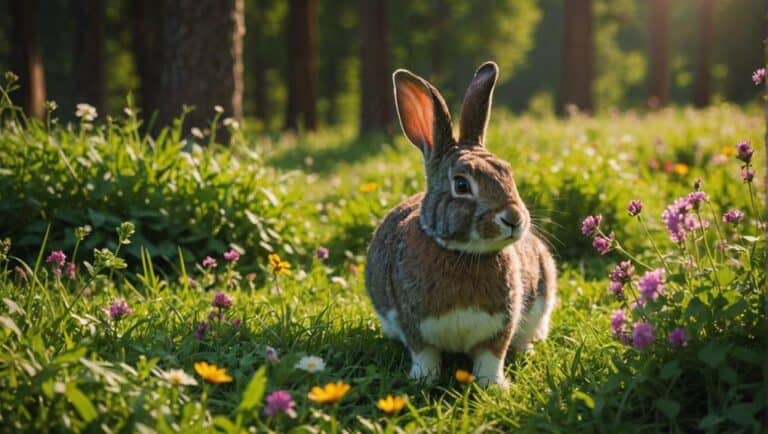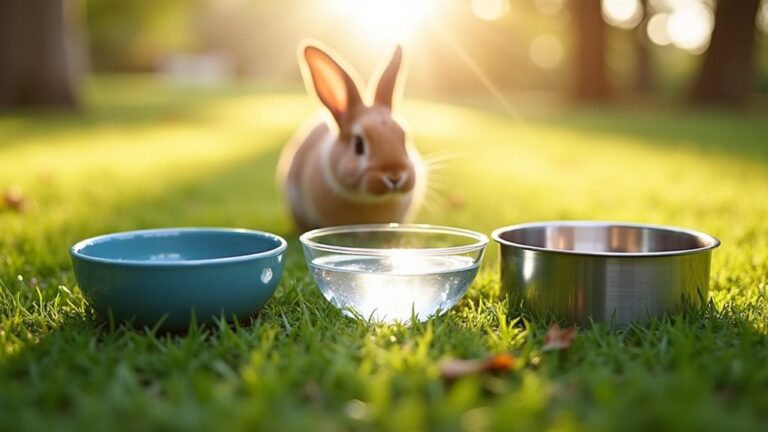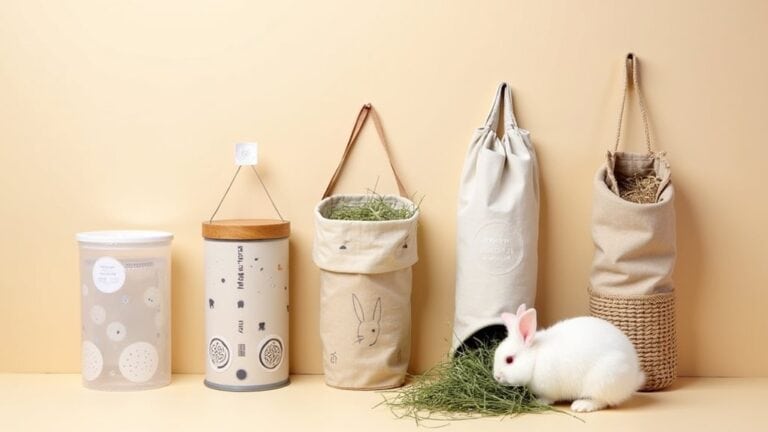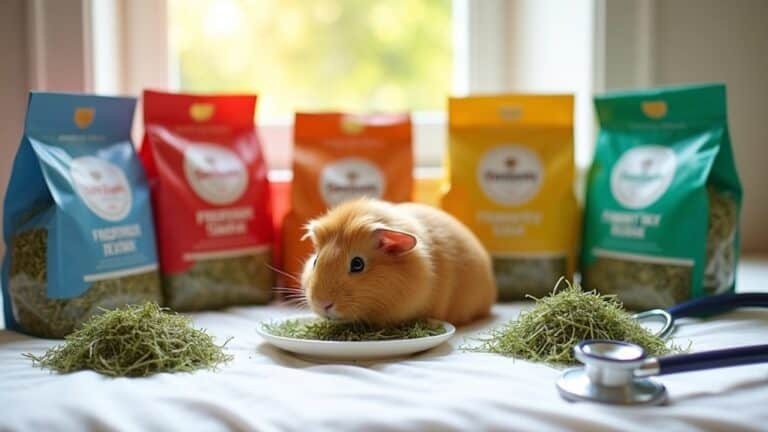Picture a rabbit nibbling contentedly on a fresh, vibrant meal that meets all its dietary needs. When you're choosing pellet food, you need to guarantee it's not just any mix but one that truly supports your pet's health. It starts with checking the ingredient list, but that's just the tip of the iceberg. From fiber content to nutritional balance, each aspect plays a vital role in your rabbit's well-being. Are you ready to uncover the essential quality checks that can make a significant difference in your furry friend's diet?
Contents
Check the Ingredient List
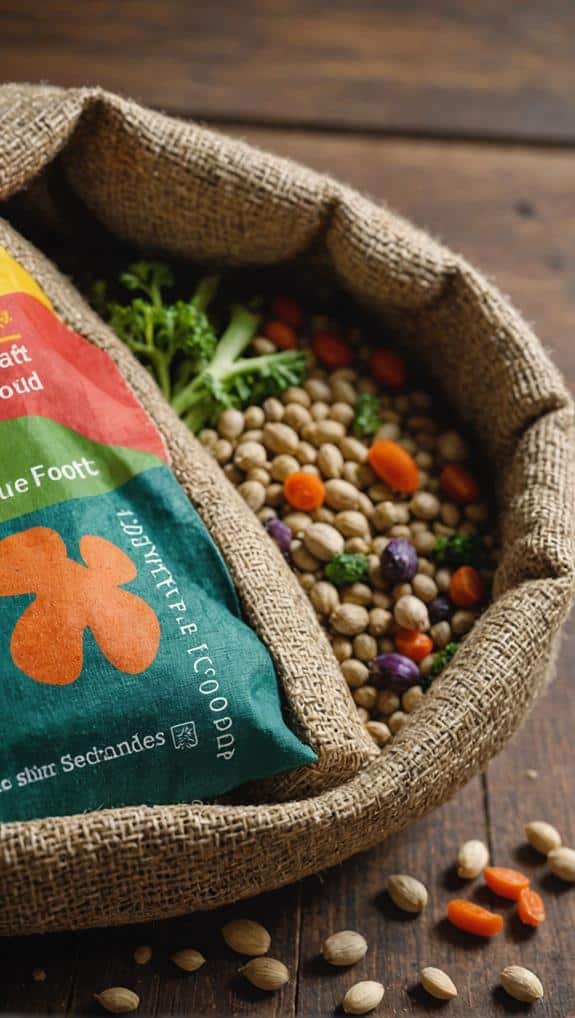
When choosing rabbit pellets, you should start by examining the ingredient list closely. The first ingredient should ideally be high-quality grass hay or alfalfa, especially for young rabbits. This guarantees a solid fiber foundation in their diet, critical for preventing digestive issues and maintaining healthy digestion, as emphasized in the importance of a balanced diet. Additionally, when selecting rabbit pellet food, look for options that contain minimal fillers and no artificial preservatives, as these can detract from the nutritional value. Always ensure that the pellets are fortified with essential vitamins and minerals to support your rabbit’s overall health and vitality. Regularly reviewing your choice of rabbit pellets can help you provide the best care for your furry friend.
It's crucial to be wary of fillers like corn, dyes, nuts, and seeds, as these can lead to obesity and other health problems for your furry friend.
Look for a guaranteed analysis on the packaging that shows at least 18% crude fiber content, as this plays an important role in maintaining your rabbit's healthy digestion. Additionally, steer clear of pellets that contain dried fruits or unnecessary additives, which can create dietary imbalances and potentially harm your rabbit's health.
Lastly, assess the freshness of the pellets by checking the expiration date and confirming they've a fresh smell and vibrant green color. This is a good indicator of high-quality rabbit pellets that will support your pet's overall well-being.
Assess Fiber Content
Evaluating fiber content is vital for safeguarding your rabbit's digestive health. When selecting rabbit pellets, aim for a fiber content of at least 18%. High fiber not only promotes ideal digestive health but also supports gut motility, reducing the risk of serious digestive issues like gastrointestinal stasis.
A diet rich in fiber is integral to maintaining a healthy weight and preventing obesity-related health problems, which can greatly impact your rabbit's overall well-being a balanced bunny diet.
Start by analyzing the ingredient list. The primary ingredient should ideally be a high-quality grass hay, such as Timothy hay, which supplies the long fiber essential for your rabbit's fundamental dietary needs. Look for pellets that guarantee a minimum fiber percentage; this indicates the product's effectiveness in promoting healthy digestion.
Avoid any pellets with low fiber content, as insufficient fiber can lead to blockages and obesity, jeopardizing your rabbit's health and well-being.
Regularly monitor your rabbit's health and adjust their fiber intake as needed. Remember, an unlimited supply of quality hay should always accompany the structured fiber intake from pellets to maintain good health. By prioritizing fiber content in your rabbit's diet, you help sustain their overall digestive function and longevity.
Evaluate Nutritional Balance
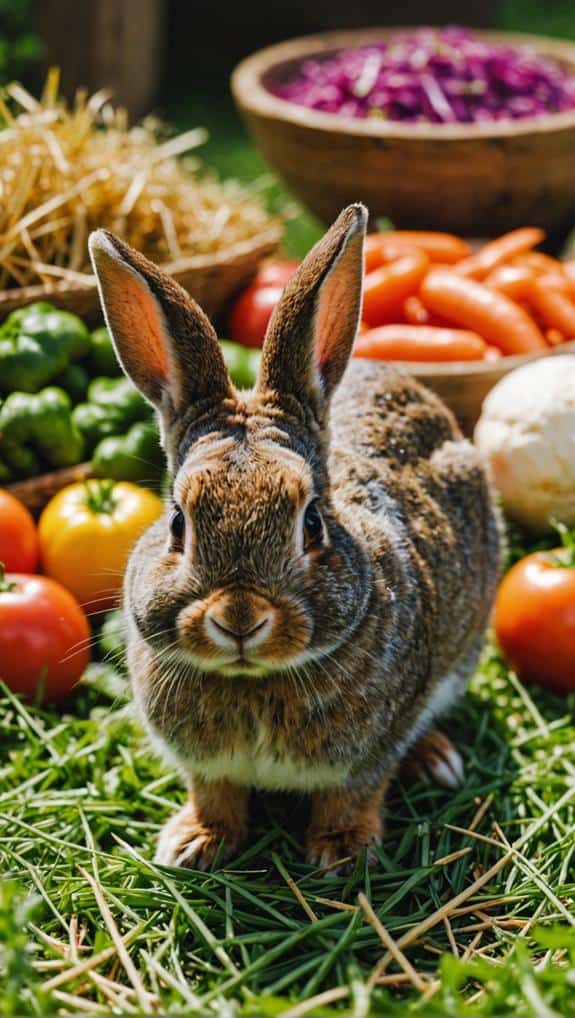
A well-balanced rabbit pellet should provide a thorough nutritional profile, essential for your pet's health. When evaluating high-quality rabbit pellets, focus on these key components to guarantee nutritional balance:
- Fiber Content: Look for pellets containing at least 18-20% fiber, which is critical for healthy digestion and helps prevent gastrointestinal issues. A high-fiber diet supports digestive health and dental wear, making it an important aspect of your rabbit's nutrition.
- First Ingredient: The first ingredient should be a grass hay, like Timothy, as this guarantees your rabbit receives the appropriate primary source of nutrition. Selecting high-quality hay is vital for your rabbit's overall well-being.
- Vitamins and Minerals: Verify pellets offer a balanced ratio of protein (ideally 12-14%), vitamins A, D, and E, and essential minerals. This thorough coverage is crucial for your rabbit's overall health.
Avoid fillers like corn and seeds, as these can detract from the nutritional value and potentially harm your pet.
Regularly check the guaranteed analysis on the packaging to confirm that the nutritional content meets the required standards for rabbit maintenance.
Inspect for Artificial Additives
Your rabbit's health can be greatly impacted by the quality of the pellets you choose, so it's crucial to inspect for artificial additives. When evaluating the ingredient list, look for the absence of artificial colors and preservatives, as these substances can harm your rabbit's wellbeing. High-quality rabbit pellets prioritize natural ingredients, ensuring your pet receives the best nutrition possible.
Pellets that contain fillers like corn, dyes, or sweeteners are typically of lower quality and should be avoided to prevent dietary imbalances. These additives may not only detract from your rabbit's health but may also lead to long-term issues.
Be vigilant in searching for clear labeling that indicates the absence of artificial substances, as this reflects a brand's commitment to producing healthier pet food options. Always opt for brands that emphasize transparency in their ingredient sourcing and formulation.
Such transparency often correlates with higher nutritional standards, ensuring you provide your rabbit with a balanced diet. By being diligent about checking for artificial additives, you can support your rabbit's overall health and wellbeing, allowing it to thrive on a natural, healthy diet.
Confirm Freshness and Storage
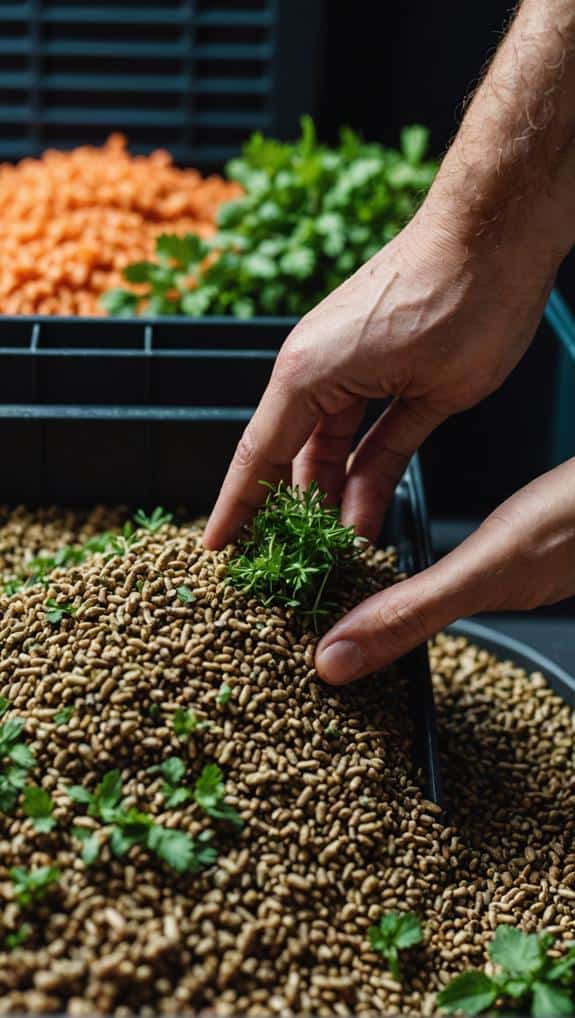
Ensuring the freshness of your rabbit's pellets is essential for maintaining their health and wellbeing. Fresh pellets retain their nutritional value and are more palatable for your furry friend.
To confirm freshness and proper storage, follow these guidelines:
1. Check the expiration date: Always inspect the packaging for the expiration date. Expired pellets can lose quality and become unappetizing for rabbits.
2. Store pellets correctly: Keep pellets in a cool, dry place to prevent moisture absorption, which can lead to mold growth.
Use airtight containers or sealed bags to protect them from pests and environmental factors.
3. Assess quality before purchase: When you purchase pellets, look for a fresh smell and a uniform appearance.
Any off-putting odors or color variations may indicate compromised quality.
Final Thoughts
In summary, selecting the right pellet food for your rabbit is like crafting a nutritious masterpiece. By checking the ingredient list, evaluating fiber content, judging nutritional balance, inspecting for artificial additives, and confirming freshness, you assure your furry friend receives the best. These quality checks serve as building blocks for a healthy diet, helping your rabbit thrive. Remember, a little diligence now leads to a happier, healthier companion hopping into a vibrant future.

